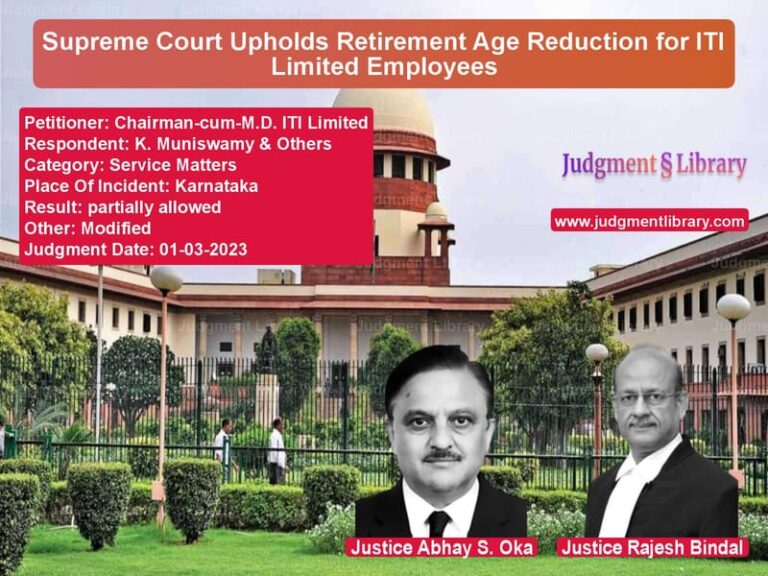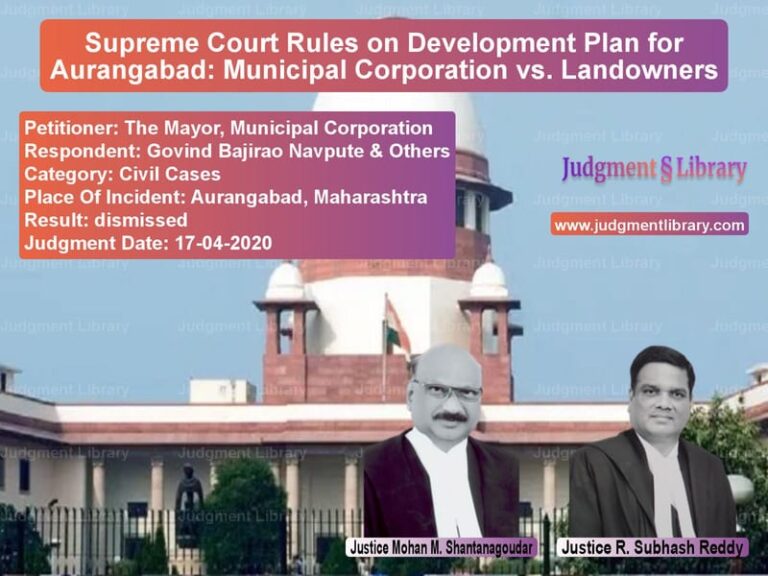Domicile/Residence-Based Reservation for PG Medical Courses: Dr. Tanvi Behl vs Shrey Goel & Ors.
This case centers around the validity and legality of domicile/residence-based reservation in the admission process to Post Graduate (PG) Medical Courses in the Government Medical College, Chandigarh. The appellants, who had been admitted under the UT Chandigarh Pool Quota, challenged the High Court’s decision to invalidate the domicile-based reservation provisions in the Medical College’s prospectus, which had allowed preference to candidates with a background in Chandigarh.
Key Facts of the Case:
- The appellants were medical graduates who appeared for the National Eligibility-Cum-Entrance Test (NEET) 2019 and participated in the counseling for admission to PG Medical Courses in Chandigarh.
- They were offered seats in the UT Chandigarh Pool Quota, which granted preference to candidates who met specific criteria, such as having studied in Chandigarh for five years, or having parents who had resided in Chandigarh for at least five years.
- The High Court of Punjab and Haryana struck down these domicile-based reservation provisions, declaring them unconstitutional, and ordered a fresh admission process based on merit as determined by NEET rankings.
- The appellants and the Union Territory of Chandigarh challenged this decision in the Supreme Court, raising issues about the validity of domicile/residence-based reservation and its application in the context of PG Medical admissions.
Petitioner and Respondent Arguments:
Petitioner (Dr. Tanvi Behl & Others): The petitioners argued that the High Court erred in invalidating domicile/residence-based reservation, as such provisions were a well-established practice in many States and Union Territories. They contended that these reservations were permissible and did not violate the Constitution, especially when aimed at ensuring local candidates had an opportunity to study and serve in their home region. The petitioners also argued that the High Court’s order disrupting the admission process for 2019-20 was unjust and unfair.
Respondent (Shrey Goel & Others): The respondents, representing the students who challenged the reservation policy, supported the High Court’s judgment. They argued that domicile-based reservations violated the principles of equality and merit as guaranteed under Article 14 of the Constitution. They contended that admissions should be based solely on merit, as determined by the NEET exam, and that residence or domicile requirements were arbitrary and unjust.
Important Judge Arguments:
Justice A.M. Khanwilkar: Justice Khanwilkar emphasized that while domicile/residence-based reservation was a long-standing practice in many states and UTs, the constitutional validity of such provisions had to be carefully scrutinized in light of the principles of equality and merit. He noted that while institutional preference was permissible, it should not result in an overwhelming bias that undermines the merit-based selection process for PG Medical Courses.
Justice Dinesh Maheshwari: Justice Maheshwari concurred with the arguments of the respondents, stating that domicile-based reservations in PG Medical admissions were unconstitutional as they conflicted with the Constitution’s mandate of equality and merit-based selection. He further stressed that while some level of institutional preference was acceptable, it should not overshadow the primary criterion of merit.
Legal Provisions and Case Law:
- Article 14 of the Constitution: The petitioners contended that the domicile/residence-based reservation violated the right to equality enshrined under Article 14, while the respondents argued that it provided unjustified preferential treatment to local candidates.
- Dr. Pradeep Jain v. Union of India (1984): The Court referred to this decision, which held that merit should be the primary criterion for admission to PG Medical Courses, and that domicile-based reservations could not be justified unless there were compelling reasons.
- Saurabh Chaudri v. Union of India (2003): The Constitution Bench decision in Saurabh Chaudri’s case was referenced to highlight that while institutional preference was permissible, it could not be extended to domicile-based reservations unless clearly justified by local needs.
Final Judgment:
The Supreme Court referred the matter to a Larger Bench to decide the constitutional validity of domicile/residence-based reservation in PG Medical admissions. While the Court acknowledged the importance of institutional preference, it highlighted the need for a detailed examination of the constitutional and legal implications of domicile-based reservations, especially in cases where only one medical institution exists within a region. The judgment left open the question of how such reservations should be implemented if deemed constitutionally permissible, particularly in relation to merit-based admission standards.
Conclusion:
The judgment underscores the complexity of balancing the principles of merit and equality with the need to ensure local candidates have opportunities for higher education in their home regions. The case will have far-reaching implications for admission policies in PG Medical Courses, particularly in states and UTs with limited medical colleges. The Larger Bench will now address the issue of domicile-based reservation and provide clarity on its constitutional validity and the proper modalities for its implementation.
Petitioner Name: Dr. Tanvi Behl & Others.Respondent Name: Shrey Goel & Others.Judgment By: Justice A.M. Khanwilkar, Justice Dinesh Maheshwari.Place Of Incident: Chandigarh.Judgment Date: 09-12-2019.
Don’t miss out on the full details! Download the complete judgment in PDF format below and gain valuable insights instantly!
Download Judgment: Dr. Tanvi Behl & Oth vs Shrey Goel & Others Supreme Court of India Judgment Dated 09-12-2019.pdf
Direct Downlaod Judgment: Direct downlaod this Judgment
See all petitions in Fundamental Rights
See all petitions in Constitution Interpretation
See all petitions in Legislative Powers
See all petitions in Judgment by A M Khanwilkar
See all petitions in Judgment by Dinesh Maheshwari
See all petitions in referred
See all petitions in supreme court of India judgments December 2019
See all petitions in 2019 judgments
See all posts in Constitutional Cases Category
See all allowed petitions in Constitutional Cases Category
See all Dismissed petitions in Constitutional Cases Category
See all partially allowed petitions in Constitutional Cases Category







